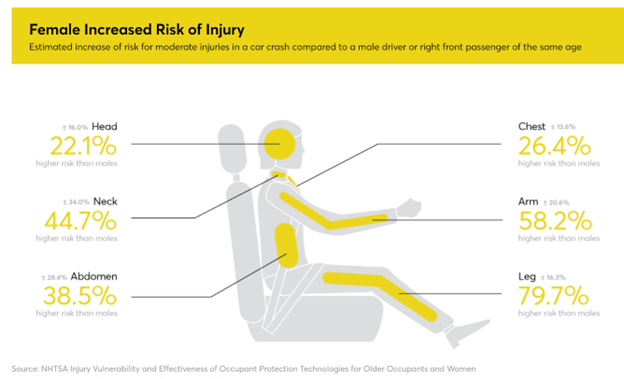Disproportionate Danger: Women face a higher risk of injury in car crashes
Women’s injuries in car crashes
Did you know that the world did not have a female crash test dummy until only last year? Even now, the National Highway Traffic Safety Administration (NHTSA) tests how “women” respond to crashes by using a scaled-down version of a male dummy – a dummy that is 4 feet, 11 inches tall, and only 108 pounds, about the size of the average 12-year-old girl. This dummy represents only the smallest 5% of women.
Women suffer more serious injuries than men in car crashes
It’s not surprising then that women suffer unique injuries in car collisions and that car designs do not necessarily account for the differences in anatomy and safety between genders or different sizes of people. For example, women are more likely to suffer from whiplash or neck injuries than men in rear-end accidents, even with little visible damage, because they typically have less muscle mass in their necks and shoulders, offering less protection from sudden forces. It gets worse: Female drivers and front passengers are 17% likelier to be killed in a car crash than a male occupant of the same age, and any seatbelt-wearing female vehicle occupant has 73% higher odds of being seriously injured in a frontal car crash, according to the NHTSA.
A study from the research and education arm of the insurance industry, the Insurance Institute for Highway Safety (IIHS) found that women are likelier to suffer leg injuries, broken bones, and traumatic brain injuries (TBIs) in certain types of crashes. This image from the NHTSA is a sobering view of women’s risks of injury:

Why are women more vulnerable on our roads?
For many of these injuries, the cause of the increased frequency and risk for women is unclear. Differences in anatomy and the lack of adequate crash test dummies to demonstrate women’s needs in design are part of the answer. It was only in 2003 that researchers began using even the woefully inadequate scaled-down 12-year-old-like dummy described earlier. Luckily, a Swedish scientist and director of Sweden’s National Road and Transport Research Institute, Astrid Linder, introduced a female crash test dummy to the world in late 2022. While agencies and car companies still have to take specific steps (like regulation) to require testing using the female dummy, the hope is that the innovation will lead to safer seatbelts, safer airbags, and safer occupant compartments for people of all genders and body sizes.
Another reason women tend to sustain injuries more frequently and at greater severity than men is that women are likely to drive smaller, lighter cars than men. In this blog, I talked about how heavier vehicles cause more damage and worse injuries, and these vehicles only get more and more common on our roads. According to the IIHS study mentioned above, women are likelier to be driving the struck vehicle in side-impact and front-to-rear crashes. When you add in that they are often struck by a bigger, heavier vehicle, injuries they suffer are bound to be more serious.
Unique injuries require unique advocacy
Women or men, young or old, your injuries and your recovery needs are unique to you. Even bodies that are the same age, size, gender, and shape experience the same crash differently, because car crashes are chaotic. The insurance companies and defense doctors like to treat everyone according to a formula or an algorithm, and will say phrases like, “Most people wouldn’t be injured by that accident,” “Most people would be better by now,” or “You can’t see that much damage.” This is a distraction and an attempt to minimize the harm caused and refuse accountability. I have helped countless injured women get justice because I take the time to understand what you have experienced, and I stand up to bullies. I refuse to settle for anything less than full and fair compensation for your unique situation.
I can fight for you. If you have been injured by a negligent driver in a car crash or another accident, get the medical care you need, and call Vern Ready. Consultations are free, and there is no obligation to do anything other than talk about your options. Call 303-339-8846, or you can also schedule your free consultation with me at my office, at your home, or on Zoom/Facetime/Webex by clicking here.
